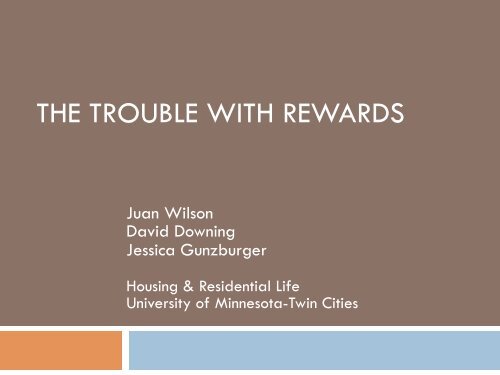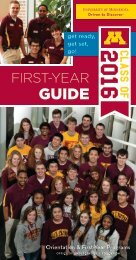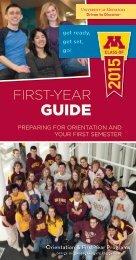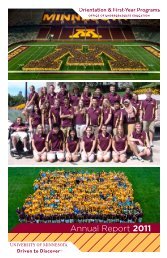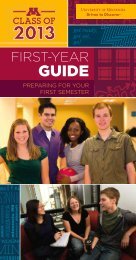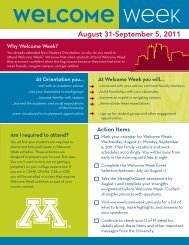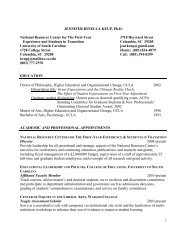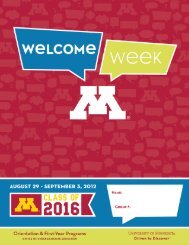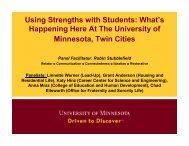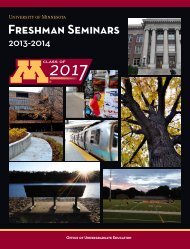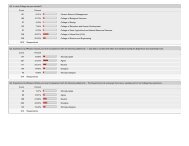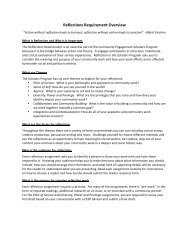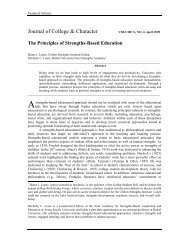THE TROUBLE WITH REWARDS - University of Minnesota
THE TROUBLE WITH REWARDS - University of Minnesota
THE TROUBLE WITH REWARDS - University of Minnesota
Create successful ePaper yourself
Turn your PDF publications into a flip-book with our unique Google optimized e-Paper software.
<strong>THE</strong> <strong>TROUBLE</strong> <strong>WITH</strong> <strong>REWARDS</strong><br />
Juan Wilson<br />
David Downing<br />
Jessica Gunzburger<br />
Housing & Residential Life<br />
<strong>University</strong> <strong>of</strong> <strong>Minnesota</strong>-Twin Cities
Overview<br />
Overview <strong>of</strong> the “trouble with rewards”<br />
Connections to Our Students<br />
Brief Q & A<br />
Where rewards, incentives, praise, etc. are currently<br />
used<br />
Implications for Practice<br />
Closing<br />
Book: “Punished by rewards: The trouble with gold stars<br />
incentive plans, A’s, praise, and other bribes” by Alfie<br />
Kohn
Rewards Ignore Reasons<br />
Rewards do not require that we understand the<br />
reason behind the issue: focus on manipulating<br />
behaviors<br />
Focus is on results and changing behaviors: how does<br />
this connect to our educational missions?
Rewards Rupture Relationships<br />
Rewards create a more destructive power differential<br />
in the relationship<br />
Jealousy & competition are created when rewards<br />
are given<br />
Collective rewards: is this creating a positive peer<br />
pressure?<br />
Rewards create an atmosphere <strong>of</strong> judgment &<br />
competition: will people ask for help?
Rewards Discourage Risk-Taking<br />
Rewards narrow our focus to include things that relate<br />
only to the rewards—reduces incidental learning<br />
Goal becomes about the reward, not about the task<br />
People are less likely to:<br />
Engage in the creative process<br />
Go above and beyond<br />
Try new things<br />
Take on challenges
Rewards Punish<br />
Come from the model that motivation is just behavior<br />
manipulation<br />
Rewards are fundamentally controlling<br />
People who aren’t getting the rewards are being<br />
punished<br />
The threat to remove an reward is a punishment
Rewards Undermine Intrinsic Motivation<br />
Do this and get that automatically devalues this<br />
Rewards are experienced as controlling<br />
We shy away from situations where our autonomy<br />
is stripped away<br />
Even self-rewarding can be detrimental
Who Are Our Students?<br />
<br />
<br />
Come from a culture <strong>of</strong> rewards, praise, & incentives<br />
Millennial Students<br />
Special<br />
Sheltered<br />
Confident<br />
Conventional<br />
Team-Oriented<br />
Achieving<br />
Pressured<br />
DeBard, R. (2004). Millennials coming to college. In M.D. Coomes & R. DeBard (Eds.), New<br />
directions for student services: Serving the Millennial Generation (pp. 33-46). San<br />
Francisco: Jossey-Bass.
Where Do You See Rewards?<br />
Praise<br />
Recognition<br />
Awards<br />
Incentives
What Are The Alternatives?<br />
• Rewards Punish<br />
• Rewards Rupture Relationships<br />
• Rewards Ignore Reasons<br />
• Rewards Discourage Risk-Taking<br />
• Rewards Undermine Intrinsic Motivation<br />
• Questions to Consider:<br />
• Why is the reward in place?<br />
• What are we trying to do?<br />
• What are we trying to accomplish?
Implications for Practice<br />
Create environments where students can<br />
listen to their inner voice<br />
Question the motivation behind why a<br />
reward/praise/incentive is in place: what<br />
is the alternative?<br />
Step by step . . .
Questions?<br />
Juan Wilson<br />
jdwilson@umn.edu<br />
David Downing<br />
ddowning@umn.edu<br />
Jessica Gunzburger<br />
jgunzbur@umn.edu


